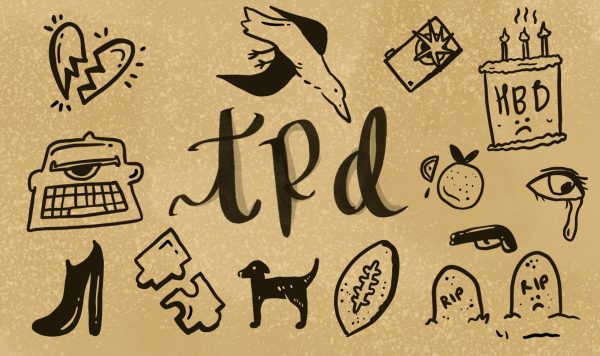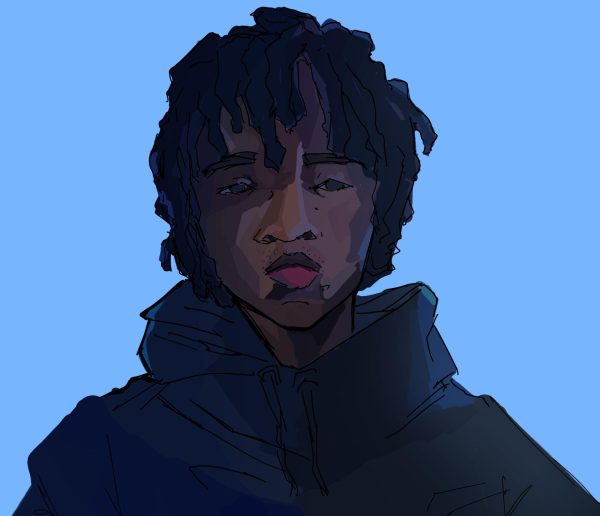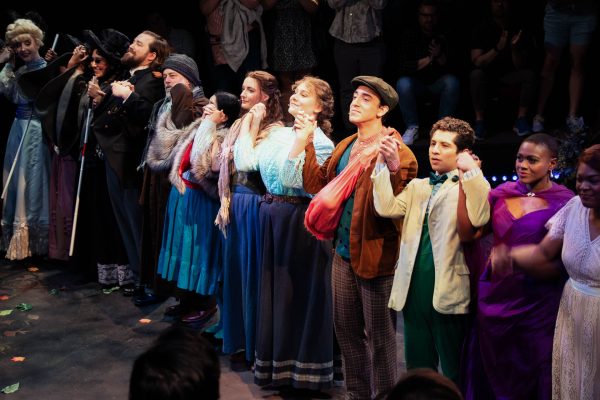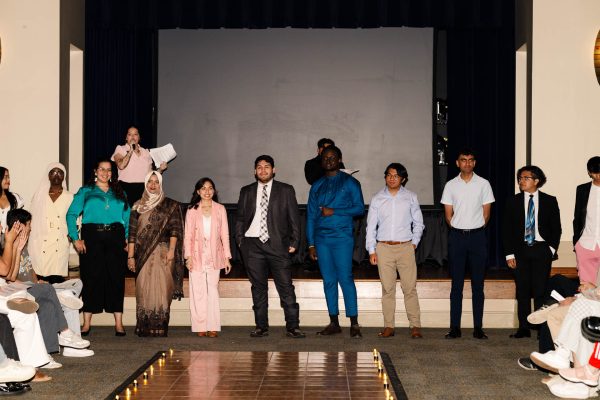Students seeks symbiotic relationship between storytelling and science
A ladybug creeped across the arm of Ana Flores as she sat under a large oak tree. Flores noticed the lady bug, smiled and greeted it as her friend.
“Biology is everywhere. You can go anywhere to observe it,” said Flores.
Flores always knew she wanted to study biology, and one thing that never changed is her fascination with little creatures. Now, as a sophomore at St. Edward’s University majoring in Biology, she is fulfilling her lifelong pursuit to study life in depth.
She enjoys all the senses employed while studying biology, but Flores’ favorite thing about biology is talking about it.
She thinks that there is a need for storytelling in the science field. She showed interest in possibly pursuing science journalism and talked enthusiastically about various subjects.
Flores recounted learning from David Johnson, assistant professor of Biology, about how plants constantly talk to each other by sending, receiving and interpreting messages through electric signals.
“Humans are self-centered in that we often don’t even realize the life around us. We think that the physical world is our own sphere,” Flores said.
Flores enjoys listening to the sounds of night, because “that’s when nature talks the most.”
Anyone who knows Flores can testify to her passion for biology.
“Ever since she was little, she used to play with lizards and frogs. She would chase them. She’s still very into little creatures. They tend to find her wherever she is,” said Ana Arriola, Flores’ mom.
Flores applies herself to all of her scientific studies. Santiago Toledo, assistant professor of Chemistry at St. Edward’s University, has observed Ana’s passion and dedication in his class.
“Ana is a passionate learner. She is simply interested in learning and gaining understanding. Although chemistry might have not been a top priority subject for her, she always showed a relentless enthusiasm for finding out more about it,” he said.
Flores’s eyes lit up when she talked about two things: biology and her family, especially her siblings.
Her parents were both born and raised in El Salvador; however, they met in Texas after immigrating as refugees to the United States in the midst of the Salvadoran Civil War.
One night on a whim, her mom decided to stop at a mutual friend’s apartment, where she first saw Flores’ dad. Flores described her mom as good-natured and hard-working, and she characterized her dad as confident with a sense of humor that takes shape in the form of playful yelling. They were drawn to each other and talked all night. In a few months, they would escape to New York to elope.
A few years later they welcomed Flores’ older sister, Arlene, into the world, followed by Flores herself, her half brother Miguel, and then April, her kid sister, who is wise beyond her years.
“April is a little CEO in the making,” Flores said, smiling. “I’m so thankful that I have had the opportunity to help raise her with my grandmother.”
April said that she was thankful to have Flores as an older sister. On weekends, they cook together and Flores always tells April about the small details of her day.
In addition to being a friend, Flores is also a mentor to her sister. April laughed when explaining that sometimes Flores teaches her things, and when she brings them up in class, her teachers will say that the subject is too advanced.
“My favorite thing is that she cares. She cares a lot,” April said.
Recently they have welcomed into the family Flores’ 7-year-old half brother Eric, who shares Flores’ passion for exploring outdoors. Eric is her father’s son, who now lives with them in North Austin.
Flores feels extremely close to her older sister Arlene, an artistic soul fascinated by ancient Roman culture.
“She’s my best friend,” Flores said.
As the older child, Arlene grew up more aware of familial conflicts as well as their parents’ financial hardships. Life was darker for her than for Flores. Arlene protected Flores from these family conflicts, which included alcoholism and domestic abuse.
Both sisters have struggled with forgiving family members that have acted wrongly. For Flores, forgiveness comes more naturally, because she understands the influence of El Salvadorian culture on the men in her life.
Gender roles differ in El Salvador from the cultural norm of the United States. Salvadoran machismo and marianismo are traditional aspects of gender that influence relationships. The concept of machismo gives sexual domain to males and depicts masculine characteristics as superior. In contrast, marianismo encourages forgiveness and moral strength in women; this often translates culturally into women forgiving affairs and other male behavior diverging from the norm in the United States.
Flores has felt the effects of this cultural disparity on her life.
“Women are often treated differently in El Salvador. Violence against women is prevalent throughout the country. Campaigns against rape culture have recently started to spread awareness, but it’s still a significant problem,” she said.
The women in her family provide a strong network of continuous support for each other. Flores’ mom discussed their “very close relationship.”
“We talk a lot about everything. When we talk about things, we share little details about everything. We talk a lot about our days, our goals and our frustrations,” she said.
Flores’ mom said she maintains open communication with her children, because she did not have that relationship with her mom.
“I spend as much time with them as I can, even now that they are all grown up,” she said.
Flores said she has tremendous respect for her mom.
“My mom went through so much, and she always just wanted to protect us. But I think that families that struggle more together tend to be closer,” Flores said.
Flores has experienced a fair share of darkness in her life. Yet, light captivates her attention instead, enveloping her perspective. She gravitates towards radiance and positivity, in both her personal life and her professional endeavors.
She attributes her positive outlook partially to her innate bubbly demeanor, but also to religious foundations and values that have stuck with her throughout life. Her long-term community pastor, Marco Tulio, instilled in her the idea that everyone is responsible for their own attitudes, choices and actions.
As far as finding light in her professional pursuits, she does this quite literally: Flores is considering a future studying bioluminescent creatures.
She finds it amazing that evolution has led to the creation of organisms that “produce energy, actual light, through biological means.” Flores is drawn to the kaleidoscope of color in these creatures, because she wonders how it developed.
“It’s a natural phenomenon,” said Flores.
Flores’ mom said she used to fill up containers with bugs when she was younger. Flores remembered doing this and smiled.
“Ever since I was little, I loved fireflies. I used to try and catch them. But it’s more than just thinking they are pretty. They represent the beauty and magic of nature. Humans produce light through machines, but they contain this light within them.”
“I think total darkness defeats the purpose of life.”











